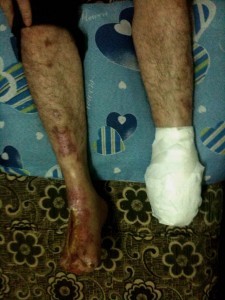Suspected Collaborator Describes Torture

The following article is based on an investigation conducted in Damascus several months ago.
Abu Mahmoud took small sips of coffee as he told his story. Often his answers were no longer than two or three words – “thanks be to God”, “God willing”, “may God forgive them”.
He asked his two little daughters to shake my hand, asking them to smile at the “ustad” (a respectful title used for teachers, attorneys and journalists, among others) as he pointed at me respectfully. The older girl was five and the younger one-and-half.
Abu Mahmoud and his family had escaped from Homs to Damascus. He miraculously regained his freedom thanks to a relative called Abu Shihab.
Abu Mahmoud was abducted in the Safsafeh quarter of Homs in April 2012 by an armed group which he refused to name.
Whenever the Free Syrian Army, FSA, took control of some quarter in Homs, it would start “cleansing” the area of regime informers.
“I was offended when I was called an informer; I won’t accept something so shameful,” said Abu Mahmoud, who is a low-ranking civil servant at the bottom of the social pyramid.
Insults, however, were not the worst thing that was going to happen to him. His kidnappers tortured him, causing physical damage that meant the toes on his left foot and half of his right foot had to be amputated subsequently.
In Homs and other places, armed opposition groups have decided who is or is not a collaborator, and all too often they get it wrong. Innocent people have paid with their lives, and others have suffered abuse at the hands of militiamen claiming to be FSA members. This abuse includes people from the “wrong” faith group who have been terrorised at opposition checkpoints in the countryside around Idlib, Hama and Aleppo. Even people who have participated in anti-regime demonstrations are sometimes abducted or assaulted.
In some cases, the FSA has denied involvement in controversial incidents, such as two cases in May and August where Lebanese nationals were abducted.
When Abu Mahmoud disappeared, his family was in a panic and Abu Shihab was the only person they could turn to for help. Abu Shihab is on good terms with the opposition groups in Homs, because he has helped families flee from there to Damascus, so he tried putting his contacts to work.
“Everyone loves me – they can’t hurt me because they love me,” Abu Shihab said. “I don’t conceal my views from anyone, so I told the rebels that what they’d done was unlawful in religious terms and unethical. Who gave them the right to torture this man?”
Mediating with Abu Mahmoud’s kidnappers, however, did not prove as easy as Abu Shihab hoped.
“It wasn’t easy to reach these militiamen,” he said. “All the groups that I know – and that’s most of the ones operating in Homs – said they had nothing to do with these people. Neither the clerics nor the local notables were able to help me. This was a small group that doesn’t listen to anyone else. We didn’t know what their demands were.”
Abu Shihab said it was only when an FSA commander put pressure on the kidnappers and “went as far as threatening punitive action” that they released Abu Mahmoud “because the man was innocent”.
Throughout his time in captivity, Abu Mahmoud suffered various forms of torture.
“There were two other men detained with me, an Alawi and a Christian, and they were treated better than I was,” Abu Mahmoud said. “They got water and food [more often]. But we were all tortured, though to different extents.”
The basement used as a prison cell was freezing cold, but that was preferable to the burning sensation of electric shocks. His kidnappers repeatedly inserted a large needle connected to a wire between his toes and connected it to an electric current.
Abu Mahmoud’s burn injuries were left to fester.
“It was either two or three days later that someone told them I wasn’t an informer, and that someone else was trying to get me out, so they stopped torturing me,” he said. “The day after that, they released me, and I found Abu Shihab waiting for me.”
When Abu Mahmoud was released, Abu Shihab took him to a field hospital in Homs where his burns and other wounds were sterilised. However, the medics had to amputate parts of his feet.
Abu Mahmoud’s entire family then travelled to Damascus together with Abu Shihab, crossing through several checkpoints, where they explained away the amputation by producing a medical report stating that Abu Mahmoud was diabetic.
Once they reached Damascus, Abu Mahmoud managed to get admitted to hospital, once again thanks to Abu Shihab’s help.
“They transplanted pieces of skin to cover over the wounds in my feet, and then Abu Shihab took me to a house provided by benefactors,” Abu Mahmoud said, as he described what he hoped would be the last part of his painful journey.
Before I left his house, Abu Mahmoud whispered to me, “We’re going to escape to Jordan soon. I hope this agony come to an end.”
Maamarji is the pseudonym of a Syrian blogger.

